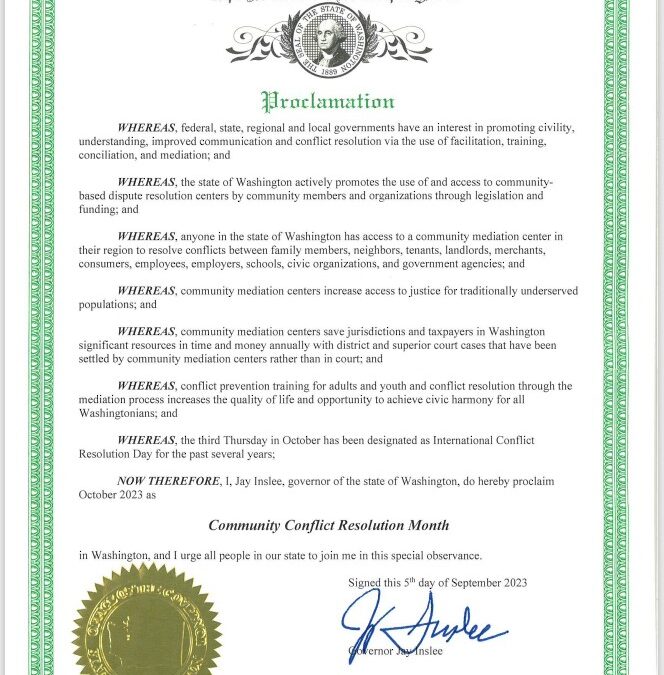by Michelle Wilkinson | Feb 5, 2024
 Picture this. You are having a disagreement with your neighbor about noise levels, and you mention it to your cousin in a phone call. After listening to the details of the argument, your cousin suggests that you need to go to mediation. Great…but what is mediation?
Picture this. You are having a disagreement with your neighbor about noise levels, and you mention it to your cousin in a phone call. After listening to the details of the argument, your cousin suggests that you need to go to mediation. Great…but what is mediation?
How does mediation work?
Many people have never heard of mediation, so you are not alone. Essentially, it is a conversation between two or more people who disagree. It is led by a trained, neutral mediator who doesn’t take sides. Instead, they ask questions and make it easier for the people in conflict to communicate the real issues underlying the problem.
The mediator will help to write up any agreements that come from the conversation, but they never decide the outcomes. The parties negotiate for themselves and determine together how they would like to fix the conflict. The parties meet and settle their conflict in a safe, confidential, and efficient manner to really hear the other party’s perspective and to also have their own ideas heard.
Why choose mediation?
Going to mediation is a less expensive and time-saving alternative to taking the issues to court. So, whether you want peace and quiet, family unity, or a financial settlement, mediation can help. Fortunately, many communities have a dispute resolution center (DRC) that provides reasonably priced conflict resolution services, including here in King County. The Dispute Resolution Center of King County is a non-profit organization that provides sliding scale fees, so everyone has access to conflict resolution services in the community. In fact, several of our services are free thanks to generous donors and government contracted funds. People support and use the mediation services we provide because there are many benefits:
- Mediation has a high success rate
- Significant cost savings compared to litigation
- You get to decide the best outcome
- Confidentiality is guaranteed by state law
- Problems are dealt with quickly
- Gain a better understanding of issues on both sides
- Leave with a written agreement that is legally binding
- Meetings take place virtually for ultimate convenience
If you want to learn more about the conflict resolution services we provide — including housing, workplace, community and family, please visit our website. If you want to set an appointment to discuss your conflict and find out if mediation is right for you, complete our intake form and one of our case managers will follow up with you.
We know that mediation works in many different types of conflict. Contact us today to see if mediation is right in your situation.

by Michelle Wilkinson | Dec 21, 2023
P R E S S R E L E A S E
FOR IMMEDIATE RELEASE
December 21, 2023
Contact Email: Michelle Wilkinson
LOCAL NON-PROFIT OFFERING FREE CONFLICT RESOLUTION TRAINING FOR KING COUNTY RESIDENTS
Seattle, December 21 – The Dispute Resolution Center of King County (KCDRC) introduces a series of new, culture-forward trainings to support individuals to better manage conflict on their own, and in their own communities. Conflict Resolution for Everyone (CoRE™) will be free to all King County residents in 2024. CoRE centers cultural diversity throughout the entirety of the training and considers the complexities related to cultural factors in conflict.
KCDRC Executive Director, Dave Martine, shares, “At this moment in time, conflict is boiling over everywhere, playing a larger role in our lives, not just in the news, but at work, school, spaces of worship, community meetings, and even at family dinners. CoRE is for everyone, whether you want to become a mediator or address problems with your neighbors, coworkers, or family in a more productive way.”
Martine adds, “King County is one of the most diverse counties in the country, so we wanted to create a program that would be beneficial and equitable to a wide range of people in our community. With generous funding from the Washington State Legislature, we created a culturally relevant program starting by holding listening sessions with residents and organizations throughout South King County. We heard perspectives from people of color and marginalized communities, including LGBTQ+, immigrant, and formerly incarcerated individuals and their family members. With a better understanding of conflict from different perspectives, we have created a truly unique learning opportunity.”
During the development of CoRE, KCDRC piloted the trainings with community members. Afterwards, they shared some reflections. Meryn states, “This training is a fun and engaging way to internally reflect on ways to be a productive mediator. Learning about your own strengths and weaknesses to help others better!” Anisa adds, “I learned a lot about how to view other people’s perspectives, as I was more internally focused. I learned to be more confident in myself since I am an introvert so that I can extend myself to help others.” Dashne offers, “I’ve learned a lot, especially having the confidence to listen to other people’s conflicts and help them to problem solve, and work to find a solution. They were able to create a training that is interactive that has practical real-world examples!”
This new, one-of-a-kind program helps people navigate conflict in their own lives by giving them the knowledge to work through disagreements with more effective approaches. Daniel Dittrick, KCDRC’s Professional & Community Education Manager notes, “The sessions are set up in modules that can be taken together, or an individual can choose just one skill they want to work on, like giving and receiving feedback or negotiation basics, intentional listening and more. Sessions will be offered at varying times each month to accommodate people’s busy lives, making it more convenient for everyone to take part. While we are launching the program virtually in English, our aim is to add in-person sessions, and eventually expand the languages offered.”
KCDRC is offering the program for free in the first year to make CoRE more accessible to everyone. Martine expresses, “This will allow us to remove many financial barriers so more people can benefit from the new program. We are acting on our organizational values by offering CoRE for free. Our staff and board are thrilled we can bring this innovative learning opportunity to our community.”
CoRE™ sessions will launch on February 1, and signup begins on January 5 at www.kcdrc.org/learn.
The KCDRC mission is to promote meaningful pathways for everyone to engage with conflict, to learn from each other, and to grow in community. A nonprofit since 1986, KCDRC provides low-cost and no-cost solutions for King County residents and businesses to uncover workable solutions to everyday problems. Last year, our staff and volunteers helped to resolve more than 7,500 disputes throughout King County. To learn more about the full range of services, visit www.kcdrc.org.
# # #
For media inquiries, interviews, or additional information, please contact Michelle Wilkinson.
For a PDF of the press release, click here: CoRE Press Release Final

by Michelle Wilkinson | Oct 20, 2023
The Dispute Resolution Center of King County is excited to announce the launch of a new program to help stabilize rental housing throughout King County. The Voluntary Initiative for Stable Tenancy and Affordability (VISTA) is an alternative to court proceedings that can be costly and time-intensive for everyone involved.
Caroline D., Director of Mediation Services, explains, “We saw a big need in King County to assist tenants and landlords in rental housing communities to find solutions to their conflicts in order to increase housing stability. Instead of immediately heading to eviction court when tenants have unpaid past-due rent, VISTA parties can voluntarily come to KCDRC for conflict coaching and mediation that will create another option to solve their problems. In most cases, it is a faster, less expensive, and more satisfactory resolution for everyone.”
VISTA Housing Program Manager, Sarah G., notes that 15 number of professional mediators have already signed up to volunteer their services for this new program. “The enthusiasm that our community has shown for this new program is really exciting. Many volunteers were involved with the Eviction Resolution Pilot Program (ERPP) over the last few years, and they want to continue this important work to increase housing stability and reduce the number of people becoming homeless in our community.”
KCDRC is a non-profit in King County that has been providing alternative dispute resolution services, including mediation and conflict coaching, since its founding in 1986. Last year, more than 7,500 residents and businesses used DRC services to solve disputes. To learn more about our services, visit www.kcdrc.org.

by Michelle Wilkinson | Oct 9, 2023
Washington Governor Jay Inslee made it official. October is Community Conflict Resolution Month in Washington! Thank you to everyone in our community, especially our volunteer mediators and staff, who help reduce conflict throughout our county and state.
Alternative dispute resolution works! As noted in the proclamation, residents of the state of Washington have access to community mediation centers to resolve conflicts between family members, neighbors, tenants, landlords, merchants, consumers, employees, employers, schools, civic organizations, and government agencies. We are proud that our work increases access to justice for traditionally underserved populations in King County, and we help people understand each other and improve communication everyday.
We thank Governor Inslee for recognizing October as Community Conflict Resolution Month. And we thank everyone in our community who assists in resolving conflicts through facilitation, conciliation, restorative practice, training, and mediation. You are promoting civility and increasing the quality of life for residents of King County. 2023ConflictResolutionMonthProclamation
by Michelle Wilkinson | Sep 30, 2021
We are delighted to announce that October is Community Conflict Resolution Month in Washington State. Governor Jay Inslee has made an official proclamation to recognize the value that mediation plays in our community to improve communication and increase civility. We appreciate Governor Inslee and his staff for their observance of the impact that conflict resolution and DRCs have throughout the state
Proclamation Community Conflict Resolution Month
by Michelle Wilkinson | Jul 31, 2021
The Dispute Resolution Center of King County was delighted to be part of recent article in the Seattle Times regarding resolving conflicts between neighbors. The article by reporter Karen G. Anderson includes tips for approaching the problem so that both sides can come to a solution that works for everyone. To learn more, read the article “Mending Fences” here.

 Picture this. You are having a disagreement with your neighbor about noise levels, and you mention it to your cousin in a phone call. After listening to the details of the argument, your cousin suggests that you need to go to mediation. Great…but what is mediation?
Picture this. You are having a disagreement with your neighbor about noise levels, and you mention it to your cousin in a phone call. After listening to the details of the argument, your cousin suggests that you need to go to mediation. Great…but what is mediation?




